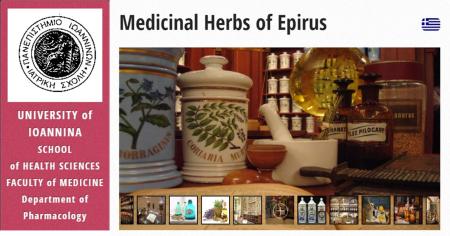
Objective:
Under this framework, the Department of Pharmacology, Faculty of Medicine, UOI, developed a web database of medicinal plants of the region of Epirus and the mainland of Greece, that contain all basic information related to the morphology of the herbs, official and popular names, taxonomy, pharmacological properties, side effects and toxicity, etc.
The users can retrieve information related to a particular medicinal plant using its official or popular name, the active compound of interest, the disease to be treated, or the region the herb grows. For every herb there are characteristic pictures and drownings, reports on pharmacological/therapeutic and toxicity effects, methods of administration and references.
Context:
Despite the fact that today the medicines prescribed in Western countries are predominantly synthesized in the laboratories of pharmaceutical companies, the medicinal plants still hold an important share in the folk healing. In cases where the modern pharmaceutical chemistry is unable to design synthetic drug molecules for the treatment of resisting or serious diseases, scientists are seeking answers and solutions in the herbs. However, this knowledge is not always organized very well, leading in many cases in misunderstandings and misuses.
Contacts:
Maria Konstandi, mkonstan@uoi.gr, https://med.uoi.gr/
Marios A. Marselos, mmarsel@uoi.gr, https://med.uoi.gr/
Panagiotis Harkitis, pharkit@cc.uoi.gr, https://med.uoi.gr/